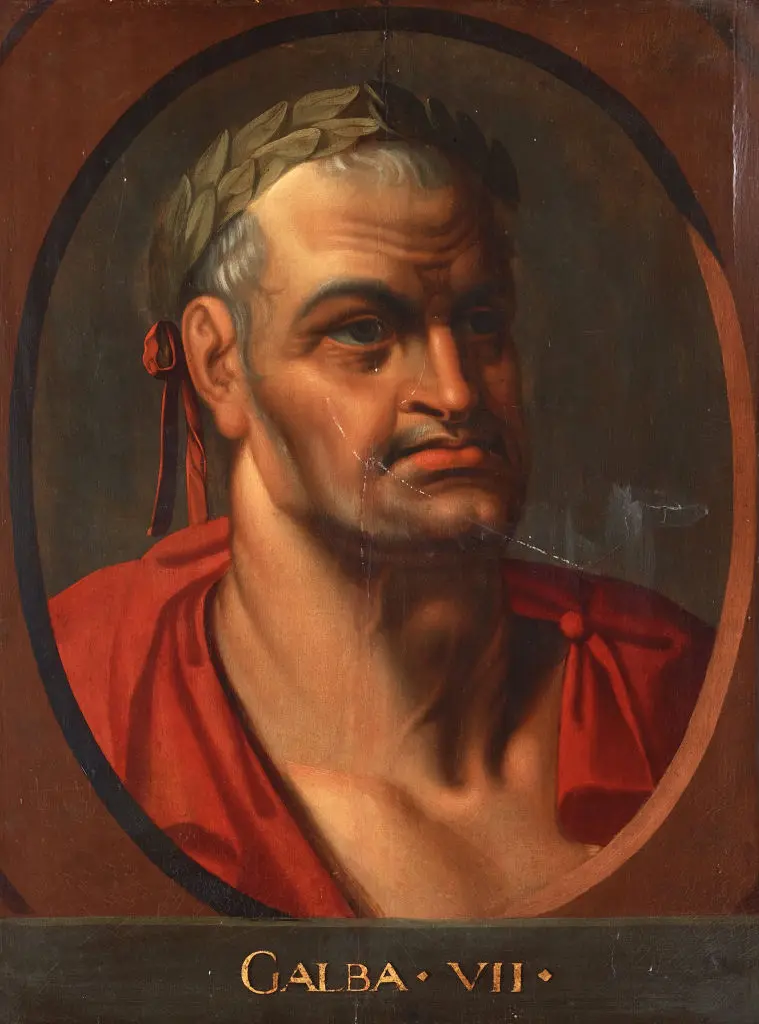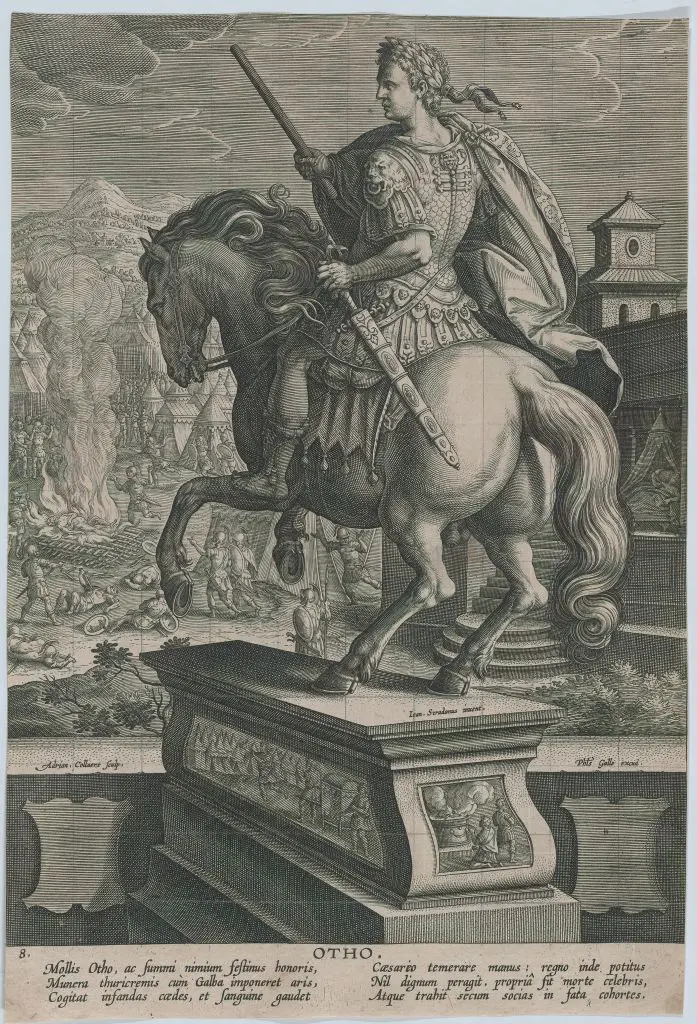Aulus Vitellius, a figure of infamy in the annals of Roman history, ascended to the imperial throne during the turbulent Year of the Four Emperors, only to be consumed by his own flagrant and brazen hedonism and political ineptitude. His brief and tumultuous reign, marked by unparalleled decadence and unbridled gluttony, exposed Rome to the chaos of his disastrous leadership. He left an indelible stain on the empire’s legacy through his incompetence and self-indulgence. Ultimately, his ignominious end serves as a powerful testament to the tragic downfall of a man who was consumed with power.
The Year of the Four Emperors was marked by political instability, civil war, rebellion, murder and suicide. Nero left a power vacuum exposing underlying tensions within the empire and four different men were proclaimed emperors – Galba, Otho, Vitellius and Vespasian. It was only with the ascension of Vespasian that stability returned.
This is the tale of the short and chaotic reign of Aulus Vitellius Germanicus Imperator Augustus, commonly known simply as Vitellius.
The Early Life of Aulus Vitellius

Emperor Vitellius on horseback (Photo by Heritage Art/Heritage Images via Getty Images)
The man who became Roman emperor Vitellius was born in the Campania region south of Rome in 15 AD. His father was a consul under emperor Claudius and the governor of Syria under Tiberius. As a young man, it’s believed he spent time alongside emperor Tiberius on the island of Capri, and also made friends with a young man who became known as Gaius Caesar Augustus Germanicus, or Caligula.
Vitellius: The Rise To Power

Aulus Vitellius (15 - 69 AD), who was Roman Emperor for eight months in 69 AD. An engraving by P. Dujardin. (Photo by Archive Photos/Getty Images)
In 48 AD, Aulus Vitellius was appointed consul, and later – around 60 AD or 61 AD – he was designated as proconsul, or governor-general, of the Roman province of Africa, a role in which it was said he performed with credit. Throughout this period Vitellius retained an unflattering reputation, and was generally seen as having an insatiable appetite for gambling and gluttony. These vices would play an important role in his short-lived future.
Galba & Germania Inferior

Emperor Galba (Photo by Fine Art Images/Heritage Images/Getty Images)
In a surprise move, Emperor Galba, who reigned for seven chaotic months between June 68 AD and January 69 AD, appointed Vitellius as commander of the legions of Germania Inferior, an area today encompassing Luxembourg, parts of Belgium and much of Germany west of the Rhine.
History is unsure of Galba’s reasons for the appointment of a man with little military experience but Roman historian Suetonius wrote ‘…a glutton was the sort of rival whom he [Galba] feared least, and that he expected Vitellius to cram his belly with the fruits of the province.’
In fact the army welcomed the generosity and friendliness of Vitellius. Galba’s rule over his soldiers was cruel, brutal and uncompromising. To him, disrespect or disobedience was a direct threat to his authority. Offences, however small, were dealt with swiftly and ferociously. Galba even refused the army pay rises, traditional for new emperors, saying he was there to rule his troops, not buy them.
By the time Vitellius arrived to take command in November 68 AD, the army was already considering an uprising. Before they could challenge him directly, Galba was murdered on the orders of his successor, Otho.
The Death of Otho & The Succession of Vitellius

Equestrian statue of Otho (Photo by: Sepia Times/Universal Images Group via Getty Images)
Aulus Vitellius was proclaimed emperor by his troops in January 69 AD, and the governors of Spain, Britain and Gaul threw their support behind him. However by this time Otho had already been proclaimed as emperor in Rome, possibly because of his role in the assassination of Galba.
When Vitellius heard of Galba’s death and Otho’s succession, he took an army to meet Otho. The two opposing sides met at the Battle of Bedriacum, close to the modern-day town of Cremona in northern Italy, in April 69 AD. Vitellius’ forces were victorious and Otho committed suicide soon after.
The new emperor was known as Aulus Vitellius Germanicus Imperator Augustus, and history has not remembered his reign with a great degree of fondness. He may have intended to rule justly, but his reputation for greed, avarice, gluttony and gambling made him deeply unpopular. Indeed one story which may or may not be apocryphal is that he starved his mother to death on the advice of a type of astrologer who said if he did, he would rule for longer.
He did very little in the way of governing, and was described by Suetonius as an extreme glutton. One famous report of a feast, of which there were up to four a day, was said to have included two thousand fish and seven thousand birds.
Writing a century later, historian Cassius Dio stated, ‘Emperor Vitellius, addicted as he was to luxury and licentiousness, no longer cared for anything else either human or divine … Now, when he was in a position of so great authority, his wantonness only increased, and he was squandering money most of the day and night alike.’
It was clear his position was growing increasingly untenable, but what happened to Vitellius?
Death & Legacy

Emperor Vitellius on the way to his execution (Photo by: Sepia Times/ Universal Images Group via Getty Images)
Around July 69 AD, the armies stationed in the eastern areas of the empire proclaimed Titus Flavius Vespasianus, more commonly known as Vespasian, as emperor.
Emperor Vitellius promptly sent legions led by Aulus Caecina Alienus and Fabius Valens – two of Vitellius’s generals – to intercept Vespasian’s forces as they marched on Rome, but it was to no avail. Vitellius’ troops were soundly defeated at the second Battle of Bedriacum and Vitellius prepared his abdication.
As Vespasian’s troops entered Rome, Vitellius’ supporters refused to allow his abdication and fiercely resisted. This led to a brutal battle, which resulted in extensive destruction and many casualties on both sides.
At this point, Vitellius attempted to escape from Rome, but he was caught hiding in a cottage. He was taken to the Gemonian Stairs, a famous Roman place of execution, from where he was dragged through the streets and executed in December 69 AD. His body was thrown into the Tiber.
His last words, shouted to his killers, were reputed to have been ‘Yet, I was once your emperor.’
Emperor Vitellius is remembered as a notorious figure marked by ineptitude, hedonism, and political naivety. His extravagant lifestyle and inability to govern effectively left a tainted legacy. Ultimately, Vitellius’ ignominious death served as a poignant reminder of the dangers of uncontrolled indulgence and the potential for one’s own vices to bring about their downfall.












